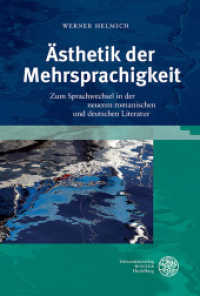- ホーム
- > 洋書
- > 英文書
- > History / World
Description
This open access book explores the story of early modern Swedish sailors and merchants captured and enslaved in the North African territory then known as Barbary (Algeria, Libya, Tunisia, and Morocco), and the efforts of their families, communities, and consuls to ransom them. Swedes were a minority among the Spaniards, Italians, Frenchmen, and British who were carried off. For that reason, Swedish authorities were initially unaware of their suffering; however, as the losses of men increased and awareness of their plight grew, it became a huge concern for Sweden s long-distance trade, particularly the import of salt essential for food preservation in the long winter months from Southern Europe.
By studying the Swedish experience of encountering Barbary, the book illustrates how a small Lutheran state navigated global interests. This volume studies letters from captured and enslaved Swedish sailors and how this correspondence played a pivotal role in shaping slave narratives and by extension Swedish identity. The book also examines these letters social impact on local communities at home, the political pressure they exerted on government officials, and their cultural significance among intellectuals. In addition, the study highlights how Swedish consuls became integrated into the local power elite in North Africa, which facilitated diplomatic negotiations and opened up opportunities for commerce, including participation in the transport and trade of African slaves.
Chapter 1. Introduction: A letter from Algiers.- Chapter 2. City of slaves.- Chapter 3. Negotiating with the Barbary States.- Chapter 4. Raising ransoms.- Chapter 5. Consuls in the Barbary States.- Chapter 6. Barbary in Hiction and non-Hiction.- Chapter 7. Conclusion.
Joachim Östlund is Associate Professor of History and Senior Lecturer at Lund University, Sweden.
His research focuses on early modern cultural history, slavery, and the history of science, with particular attention to Europe s entanglements with the Muslim world. Östlund has led major projects funded by the Swedish Research Council, Riksbankens Jubileumsfond, Wallenberg Foundations, Marie Sklodowska-Curie Postdoctoral Fellowship, and NordForsk.








